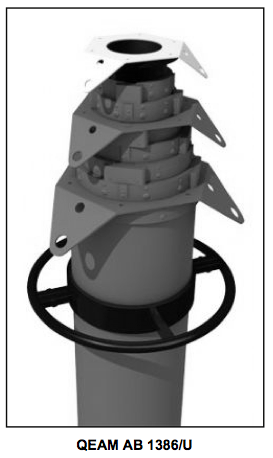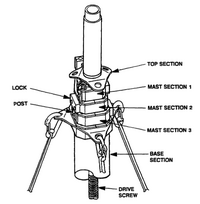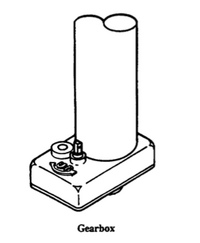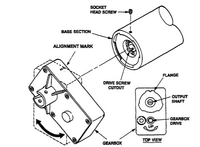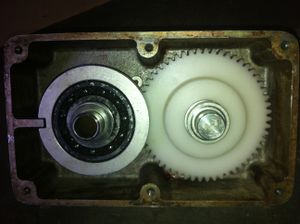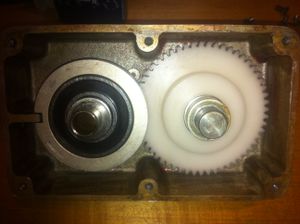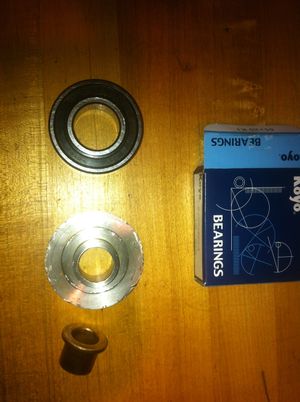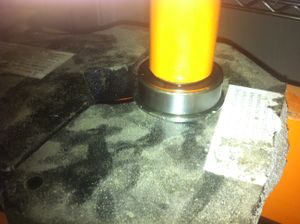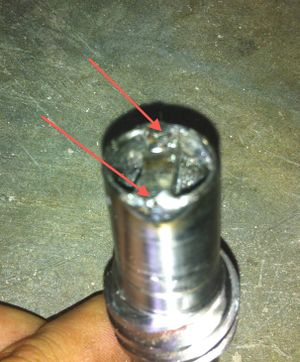Difference between revisions of "AB-1386~U"
RadioNerds (talk | contribs) |
RadioNerds (talk | contribs) |
||
| Line 1: | Line 1: | ||
| + | [[File:ab-1386-2.png|right]] | ||
==Description== | ==Description== | ||
| − | |||
| − | |||
| − | |||
Quick Erect Antenna Mast System (QEAM) [AB-1386/U] | Quick Erect Antenna Mast System (QEAM) [AB-1386/U] | ||
Revision as of 16:16, 29 May 2013
Description
Quick Erect Antenna Mast System (QEAM) [AB-1386/U]
The QEAM is a mobile quick erect antenna mast used for elevating tactical communications antennas to a maximum height of 33 ft (10M) which results in more reliable communications over extended ranges.
The QEAM replaces the OE-254, which is vastly more difficult to raise and lower due to its large volume of mast sections and other parts which are easily lost.
The QEAM mast can mount antenna receivers (feed cones, etc) such as the AS-3166 (P/O OE-254), MP-68 (P/O RC-292), AS-4292 (P/O MSE) and A3005068 (P/O EPLRS). The mast can be deployed and operated in ground and vehicular (wheeled and tracked) mounted configurations. The mast can be erected in 7 ½ minutes with two persons and in 15 minutes with one person.
Accessories are provided to assist with guying, anchoring, and operating the mast in its ground mount configuration. They include a hammer, a tripod, guy assemblies, guy stakes, baseplate stakes, crank handle, baseplate, and a radius rope.
Two mounting kits may be used to adapt the HMMWV and the tracked vehicle with brackets and hardware to deploy the mast. The mounting kits are used to anchor the mast to the vehicle and to stabilize the mast when deploying it under normal conditions (i.e., winds below 25 mph [40 kph]).
Characteristics
- Manportable, manually erected, guyed mast.
- Resists water and other environmental elements.
- Mast height is variable by deploying only as much height as is required.
Capabilities and Features
- Supports Antenna AS-3166/GRC, Antenna Base MP-68, Antenna Element A3005068-1 with Antenna Adapter A3004947, or Antenna AS-4292/U.
- Permits antenna heights from 8.3 to 33.1 ft (2.5 to 10.1 m).
- Can be deployed or retrieved by an experienced two-member team in 7 1/2 minutes under tactical conditions, or by a single operator in 15 minutes.
- Can be deployed on maximum 10-degree (17.6 percent) slope.
- Can be deployed in winds up to 25 mph (40 kph). Directional pointing accuracy is maintained in winds up to 60 mph (96 kph). Maximum survival wind speed is 80 mph (128 kph).
Equipment Data
Temperature Ranges:
- Operating
- -40 °F to 125 °F (-40 °C to 52°C)
- Storage
- -50 °F to 160°F (-46 °C to 71°C)
- Mast Type
- Vertical-raising, telescoping, tubular aluminum
- Extended Height
- 33.1 ft (10.1 m)
- Nested Height
- 8.3 ft (2.5 m)
- Max. Operational Wind Speed
- 60 mph (97 kph)
- Max. Survival Wind Speed
- 80 mph (128 kph)
- Guy Assembly Lengths:
- Top
- 54 ft (16.5 m)
- Bottom
- 19 ft (5.8 m)
Weights:
- Mast
- 42 lbs. (19.1 kg) unpacked
- Universal HMMWV Mount
- 56 lbs. (25.4 kg)
- Tracked Vehicle Mount
- 40 lbs. (12.2 kg)
Common problems
No gearbox, or inoperable gearbox
If the gearbox is missing, this tower can still be used. you simple remove the drive screw and manually extend the tower. You will need something to place between the last section to hold it up, or a pin to prevent it from collapsing. The process for removing the drive screw is detailed in the TM linked below Section 4.12.
Section will not collapse
The tower is designed so that the sections cannot collapse until the one below it is fully down, there is a small toggle inside the "lock" where the "post" unlocks the next section. If for some reason the "post" engages but does not unlock the next section, use a flat screwdriver to toggle the lock and the section will unlock.
Frozen Bearing
Upon removal there is a large bearing, I had to replace this, as mine was frozen up.
The proper replacement bearing is a Koyo #62052RDC3. I obtained mine from the local Bartlett Bearing. I walked into the store and showed them what i needed, and they found it on the first try. amazing service!
You will need a press to do this..
- Remove the bearing from the housing
- To remove the outer ring, lightly tap the bearing while holding the outer ring (the one with the notch)
- Place the bearing in the press or suitable jig, and press the brass bushing out the top from the rear.
- To remove the aluminum backing is more difficult. It is attached in the center of the bearing in a way that wasn't designed to be removed. You will have to cut the bearing from around it. I tried using different pullers, but the aluminum will bend and deform before the bearing can be removed. I used a Dremel to make slots in the outer race while in a vice, and carefully tap with a chisel. You should be able to disassemble the bearing piece by piece.
- Once this is cut off you can press the aluminum backing onto the new bearing
- Press the brass bushing back in the front
- Press the outer ring (one with the notch) back on
Crank turns, but won't raise or lower the tower
This is usually due to the output shaft notch no longer being tight. When the crank shaft is turned, this also turns inside the shaft and wont turn the large screw on the tower.
To test this, put a screwdriver in the output shaft and attempt to hold the shaft in place while turning the crank, if you can turn the crank, and the screwdriver doesn't turn, you have confirmed it.
I attempted to resolve this many ways,
- Dimpling the edge of the shaft to make the notch tight
- JB Weld
- Wedging it by taping it fron the back
- Welding
Welding was the only one that worked. What you dont want, which i was privileged enough to experience, is to get the tower up, then have this loosen up again and have no way to lower it.
Weld it, you don't want this problem.. trust me.
Other Images
Gear Box Images
My Truck Pictures
Additional Files
- OPERATOR'S AND UNIT MAINTENANCE MANUAL INCLUDING REPAIR PARTS AND SPECIAL TOOLS LIST EQUIPMENT DATA
- MAST AB-1386/U (NSN 5985-01-381-6341) (EIC:N/A)
- OPERATOR PMCS WITH ELECTRICAL EQUIPMENT MOUNTING MT-6967/G (NSN MT-6968/G (NSN 5975-01-390-9612) (EIC: N/A)
